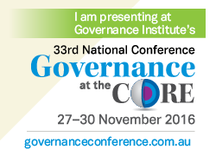|
This is the second update of several to summarise observations from the 33rd Governance Institute of Australia National Conference being held in Sydney this week. You can read the first update (opening session) here. This update includes observations from the late morning and early afternoon sessions. The question explored by the panel in the late morning session was "Creating a safe harbour: Beyond the business judgement rule". Judith Fox (GIA Policy Director), Prof. Pamela Hanrahan (UNSW Business School) and John Stanhope (Chairman, Australia Post) discussed proposed changes to company law (safe harbour provisions). The panel noted that the establishment of a 'safe harbour' clause might lead to inappropriate incentives for directors and executives. Whether this possibility is any better or worse than the current situation (of boards providing little if any guidance in their forward looking statements) was discussed at length. The question was not resolved explicitly. However, the panel did agree that it is reasonable to expect boards to provide shareholders with 'fair' and 'reasonable' guidance' to indicate strategic intent, so that shareholders could make informed decisions about their ongoing interest in holding shares and director selections. The early afternoon session spoke to emerging trends that directors and boards need to be aware of if they are to contribute meaningfully to the future performance of the company. Specifically, the topics were the Internet of Things and Innovation. Mike Briers grabbed the audience's attention by demonstrating how pervasive the IoT phenomenon is becoming: the level of connectedness and quantity of data generated as a result of millions of connected devices is expected to dwarf every other sector of commerce and life except, perhaps, astronomy. The challenge that IoT presents for boards relates entirely to strategy. How can or should boards respond to the ever advancing wave of technological innovations? What impact might any of these innovations have on current business models and markets? Boards need to create space in their meetings (and perhaps add meetings to the calendar) to grapple with these questions directly. Briers suggested that the rate of innovation is occurring at such a pace and complexity that boards and executives will struggle to understand, let alone respond well. Therefore, boards need to seek symbiotic relationships with other companies and experts. Collaboration is no longer an option. Companies should also prioritise investments in 'complex integration solutions' over behemoth systems. Amongst the turmoil, one thing was clear: if companies are not actively investigating emerging trends and technologies including the Internet of Things (amongst others) they risk becoming irrelevant to their current and future customers.
0 Comments
The 33rd Governance Institute of Australia national conference got underway in Sydney this morning. Some 160 'governance professionals' assembled from around Australia to explore the role of the company secretary, and emerging governance thinking and practice. This, the first of several conference reports, covers the first session of the two-day conference. (Note: these updates are not exhaustive accounts of ever session. Rather they provide summaries of key points made by presenters and observations from an interested delegate.)
The 33rd GIA conference promises much. The organisers have assembled a good programme and a strong line-up of speakers. However, the opening session felt like an opportunity missed. Why the organisers chose to lead out with a regulatory update (instead of a thought provoking message from a gifted communicator to reinforce the core theme of the conference) was beyond me and most of my table neighbours. Regardless, I look forward to the sessions that follow. More soon.
Earlier this year (September), I had the privilege of attending the Organisations with Purpose conference, an event that sought to address questions about why organisations exist—their reason for being. The two-day event, which was jointly organised by London Business School and Blueprint for Better Business, was well-attended by some leading academic thinkers and, significantly, a few influential business leaders as well. An overriding theme pervaded the conference: Companies with a single, clearly defined and communicated purpose tend to perform better than those that do not. To hear others summarising evidence-based research and case studies on a topic that I've been interested in for some years was great. It filled in several gaps in my understanding. A summary of the conference proceedings is now available. I commend them to you. The high point of the conference was the Blueprint for Better Business framework, a model to guide decision-making in purpose-driven businesses. It was compelling, to the extent that I've registered to attend a two-day immersion workshop, ahead of introducing the framework to companies in Australasia from early 2017.
 The Governance Institute of Australia's national conference starts on Sunday 27 November at the Hilton Hotel in the Sydney CBD. I'll be at the conference on 28–29 Nov(*) to listen to what looks like a great lineup of speakers, and to serve as a panelist on Tue 29. The panel topic is "The pursuit of productivity". If you're going to be at the GIA conference and want to say hello, please feel free to phone me or send an SMS. My number is here. Following the conference, I will remain in Sydney for two more days (Wed 30 Nov and Thu 1 Dec) for private meetings. If you would like to take advantage of my proximity to chat about corporate governance; board effectiveness; corporate strategy; emerging trends and the findings from my recent research; or, any related matter of interest, I'd be delighted to make a time to meet. Please get in touch to set up a meeting. Currently, there are several gaps in my diary including dinner on Wed 30 Now and breakfast on Thu 1 Dec. (*) Session summaries will be posted here throughout the conference. Please check back if you are interested.
One of the joys of working internationally is the opportunities it presents to discuss topics in a range of different contexts. While most of these discussions are either private (with clients) or rather impersonal (conference presentations), some are recorded for the benefit of a wider audience—including this recent conversation with Lavaniya Das of Azeus Convene. We talked about corporate governance, boardroom ethics and how the C-suite is dealing with Brexit: If you want to explore any of the points discussed in this interview, or challenge them, please feel free to either reply below or get in touch via email.
A burning question for many directors is encapsulated in the title of this muse. In recent years, the business media has published many stories about boards; questionable board practices; assertive CEOs that 'take over': and, missteps and failures that seem to emanate from the boardroom. Some of these stories are justified, whereas others lack substance. Alongside, the academic community has investigated the question, although typically from the perspective of a desk-based researcher using public data or, at best, interview comments. Reliable knowledge about the board's role in influencing business performance has remained elusive. Sadly, unsubstantiated claims have filled the void. I have spent several years investigating the question of board influence beyond the boardroom as well, to discover whether boards are simply disempowered groups that meet to rubber stamp decisions, or whether influence (especially over firm performance) is possible. The quest has included longitudinal observations of board meetings; interviews with chairmen, directors and chief executives; and, the analysis of very large piles (mountains, seemingly!) of board papers, minutes, reports and observation notes. Useful insights have been gleaned from informal discussions with directors have provided useful insights as well. While no definitive answers to the burning question have emerged (in any predictable sense anyway), a pattern is clearly apparent:
Findings have been written up in my doctoral thesis. These findings are summarised in two published papers, with similar sounding titles.
Copies of the papers are available here. If you want to know more, please get in touch. I'd be glad to discuss the findings (especially the implications and guidance for practice) with any board or group intent on realising and sustaining high levels of company performance.
If I had a dollar for every time questions of board effectiveness and how to drive performance from the boardroom has been discussed in my hearing, I'd be well off. My role in answering these questions will continue in Sydney at the end of the month.
After initially standing strong, sustained lobbying and public commentary seems to have had an affect on British Prime Minister, Theresa May. News has emerged that the PM has backed down on an earlier pledge to introduce 'employee directors'. This is an interesting development. The Institute of Directors and unions (understandably) were supportive of the proposal. However, many business leaders expressed wonderment. Corporate governance has entered troubled waters, without question. But to suggest or even believe that structural changes might lead to better outcomes, without considering the function of boards holistically is short-sighted, at best—regardless of what any enquiry might determine. But let us not pre-empt the process now underway. The political process owes as much, to its constituency and, more generally, to the British economy. What do you think?
The 'best paper' awards from the 13th Annual Corporate Governance Workshop (of the European Institute for Advanced Studies in Management, held in Milan last week) have just been announced. The Award Committee recognised Board influence from and beyond the boardroom: A provisional explanation, my paper. While the paper was warmly received when it was presented and many interesting discussions followed during the conference and since, the award was an unexpected surprise. That the findings from my governance research have been recognised by an international group of scholars is truly gratifying. Thank you, I am honoured. If you want to learn more about the research and findings (especially the practical implications for boards), please get in touch.
|
SearchMusingsThoughts on corporate governance, strategy and boardcraft; our place in the world; and other topics that catch my attention. Categories
All
Archives
May 2024
|
|
Dr. Peter Crow, CMInstD
|
© Copyright 2001-2024 | Terms of use & privacy
|






